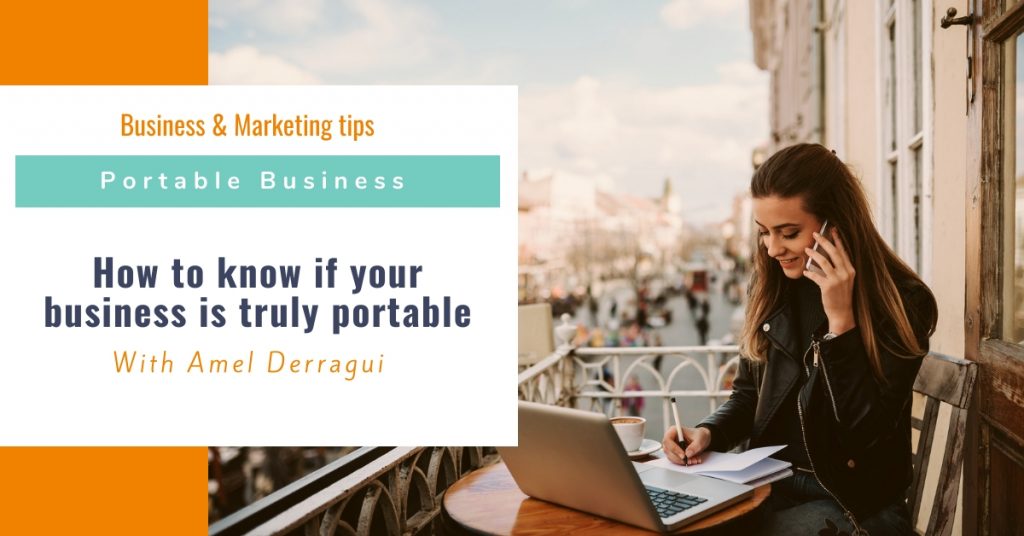How to know if your business is truly portable

There has never been a better time to start and build a successful portable business!
But there are some things you need to know to evaluate whether your business is truly location independent and if it’s not, then what to do about it. This is going to be a very practical guide to really understanding what it takes to make a business portable and successful.
This blog article is a summary of the related podcast episode.
Click here to listen to the tips mentioned in this article.
Before I take you through some of the critical practical questions, I want to make sure that you understand the difference between a portable business and portable skills.
I’m going to use the example of a yoga instructor – every time an instructor relocates, they need to develop a new client base, a new studio even. That’s an example of a portable skill, not a portable business. Now, if you are teaching yoga online and generating revenue from that – that might be a portable business!
I also want to share my 60/40 rule with you – ideally 100% of your revenue should come from sources that do not depend on where you live. If that’s not possible, then you ideally need 60% of your revenue to come from portable sources. 40% is the absolute minimum.
This article focuses very much on the practical and logistical elements of making your business truly location independent. If you’d like to know more about the basics of portable business, here are two episodes that will help you:
- What is a portable business and how to make it scalable
- 3 risky mistakes expat partners make with their portable business
The 4 questions you need to ask yourself
These are the really big questions that will tell you whether your business or your new business idea is currently portable.
- Is your client base dependent on your location?
If you leave the country where you are now, will you lose clients or will you be able to keep them? If your marketing and business development activities are dependent on where you are living now, your business isn’t going to be location independent. You need to be focused on marketing beyond your location, preferably in a virtual space online. So think about where and to whom you are marketing your services or products.
- Do you need to physically be in the same space as your clients or suppliers to deliver your service?
Here, you need to think about the delivery process of your product or service and the management of the customer service. Do you need to be in a specific space to make it happen?
- Are the day to day operations of your business location dependent?
You also need to consider the practical logistics of making your business and your revenue happen. Where do your production and logistics take place? Can you do that anywhere or do you need to be in a particular space or place?
- Is the legal context for your business allowing you to be location independent?
This is probably the biggest barrier that global nomads face: Can you legally set up a company where you are? Can you set up a company in your home/tax base but work in any location? This is something that you really need to investigate and understand.
If you answered ‘no’ to some of those questions, don’t worry – I’m going to share my tips and resources for making sure your business really is portable.
But before that, I want to mention your mindset: Don’t let any negative answers to these questions convince you that you can’t do this! There are so many opportunities right now, with great technology and legal developments.
“You don’t have to have every single answer to make a start!”
Map out your business activities
I have a challenge for you – map out all the activities required to make your business function. Not just the marketing and customer service, every single activity from before you deliver your product or service to post-delivery and follow up.
Mapping out these activities is a great way to be able to assess whether or not each one is location dependent.
I’m going to share with you my favorite tool to do this – the Business Model Canvas. It is a great visual tool and using it will help you to capture every single aspect of your business.
Here are the links to a simple tutorial on this tool and also templates to get you started:
Once you have mapped all your activities, you can see which parts are dependent on your physical location and see if there’s a way to do them virtually.
When you’ve done that, go back again to my first four questions to see if anything has shifted.
Four ways to make your business portable
These are the four pillars you need to make your business really location independent. We are so lucky to live in a time when we have so many resources and options!
- Technology
Whether you are a techie geek or you hate it, you need to embrace technology. If you’re not confident, take baby steps, be patient and the more you try, the easier it will get.
There are the basics – a good laptop and access to the internet. But you need to go beyond that to think about how you can have a paperless business. This will allow you to access everything you need, wherever you are, and without moving a huge hard drive or physical files with you every time you travel!
I recommend Dropbox Business for storage and accessing all your documents in real time from anywhere, as well as allowing your team to access and work on documents in real time. I also love Google Drive that I use to work on ongoing projects or collaborations with my team, partners or clients. Once the project is finished I save it on Dropbox.
You also need to research systems and apps that will work best for your own business.
For example, Renata Carvalho was able to make her interior design business portable by using a specific e-design app. Renata is just one example of a portable business.
Here are fourteen more examples to inspire you.
- People
People could be key to making your business portable and scalable.
For example, Melissa Matthews is an expat partner who set up her business in the US, while she moves from one country to another. The key to her success was setting up her agency in her home and client base (the US) and growing a team that manages it locally.in the US to service her mainly US-based clients.
Click here to learn more about Melissa’s business
So, who can you hire or work with to make your business portable? It may be through traditional hiring but you should also consider freelance platforms to find particular services or virtual assistants.
Here are two examples of freelance platforms:
- Outsourcing
What tasks can you outsource to other companies or partners to enable your business to become portable? I really want you to think creatively about this because it can really make a difference.
For example, Andrew Jernigan of Insured Nomads uses third parties and partners to run some of the activities that might not be portable, allowing him to be location independent:
Click here to learn more about Andrew’s story.
Other options might include using dropshipping if you have an e-commerce based business, allowing you to outsource all the logistics, from warehousing to delivery:
Read more about drop-shipping.
If you are an artist, there are services that will take your original art and turn it into a dress, bag or poster, even taking care of shipping it. The downside to this is that your profit is very low but all you need to do is send a PDF of your design to them:
There are so many new resources emerging in this area all the time so do your research – you might be surprised by the potential it opens up for your business.
- Regulations & administration
This is the tough one! There are still many challenges for expats in general and expat partners in particular, specifically those who move regularly and can be caught up in visa restrictions and other legal issues.
Here is the most common tip to be able to run a business on the move:
Register the business in the “home country” or “passport country” where you are tax based as an individual or a citizen. While you travel, run the business as if you were doing it from that country, observing the regulations of that same country.
However, this solution does not work for everyone. For example, some countries do not allow you to run a company without being physically present there for the majority of the year. Also, this gets complicated if the visa of the host country does not allow you to set up a company there either.
This is why being a digital nomad has nothing to do with being an expat or a global nomad.
Digital nomads typically have a business established in their home country that allows them to travel regularly but return to their home base most part of the year. Expats have to settle down in those host countries for a few years instead of a few days, weeks or months.
This is still the area where we need to advocate for more comprehensive regulations.
But there are some exciting developments happening!
There is one country that is innovating and welcoming global citizens who are pushed away by such regulations: Estonia just recently launched their E-Residency program that allows people who are in this “no man’s land” situation to find a “home” for their portable business. Here are two episodes to explain how this works:
- What is the Estonian E-Residency program about and how does it serve portable businesses.
- How to establish a portable business through the E-Residency program in Estonia.
My most important message for you is that legal issues and tax issues are something that you cannot ignore. It is well worth it to invest in some specialist and qualified help. To help you think about some of the legal issues you need to address, I have an interview with lawyer, Rosiane Houngbo-Monteverde.
But I also can tell you that there are very few lawyers out there who truly understand the context of expatriation and living across borders. What I recommend you to first reach out to experts of each country that concern you, then reach out to bi-national or bi-lateral lawyers or experts (e.g. your home country consulate in your host country should be able to refer you to some people). And once you gather all the information, do your own gut checks as well to make your own decision!
“Just like with health issues where doctors can’t find a solution or diagnosis, you need to be your own advocate when you live the expat life with a complex regulatory context. Don’t let that stop you!”
To help you work your way through this, here are three aspects of your legal and administrative context that you need to look into:
- Where is your tax base as a “citizen”?
- Where should your business be registered and tax based?
- Where would you need to pay additional taxes or collect taxes such as VAT?
Then, you need to look at how you can optimize these three components while complying to rules that apply to your specific case.
As you can see, setting up a truly portable business comes with a big list of aspects to consider, as well as its own set of challenges. But here is what you need to keep in mind to be truly successful in your journey as an entrepreneur: do your research, get comfortable with the uncertainties you might have to deal with, be creative and think outside the box when looking for solutions, and don’t take “no” for an answer. Instead, face every challenge and ask yourself how you can turn it into great opportunities!
This can be a daunting learning curve, but this is why only few people really succeed at it, they are the ones who don’t give up when it gets tough. Once you’ve passed that mental roadblock, you will realize how everything becomes so worth it! Because you will finally be able to make the impact you want in the world while creating your financial independence and freedom on the move.
Share Your Love!

Do you enjoy listening to this podcast show? Leave on your review on your favorite app – iTunes, Stitcher, Spotify, Google Play
Share Your Thoughts!

Connect with the Tandem Nomads community and share your comments!

